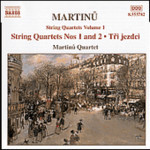
String Quartets Nos. 1 and 2 / Three Horsemen
 $25.00
Out of Stock
$25.00
Out of Stock6+ weeks add to cart
MARTINU
String Quartets Nos. 1 and 2 / Three Horsemen
Martinu Quartet
[ Naxos / CD ]
Release Date: Monday 1 January 2007
This item is currently out of stock. It may take 6 or more weeks to obtain from when you place your order as this is a specialist product.
"The Martinu Quartet offers fluent performances."
- Turok's Choice, March 2002
--------------------------------------------------------------------------------
"Bohuslav Martinu's first two quartets (1912, 1917) are now lost. What is considered his First Quartet was written in 1918 for a group formed from the Czech Philharmonic. A young friend of Martin?'s was its leader and had just gotten him a job plying in the orchestra. It is a long quartet (39 minutes) and lacks the organized conciseness of the later quartets, yet it has some of Martinu's hallmarks, even though it sounds more like Ravel.
"The Second Quartet was written in Paris in 1925 when Martin?'s was studying with Albert Roussel. It is more tightly organized and sounds much more like Martinu.
"The filler, the Three Horsemen, is Martinu's earliest surviving composition. It was written in 1902 when he was a 12-year-old. The story is that three riders brought home the story of the burning of Jan Hus in 1417. Martinu's was obviously fired by this tale. The themes are well handled, though without most characteristics of the composer. It is certainly a welcome addition to the recorded literature."
- American Record Guide (Carl Bauman), September-October, 2000
--------------------------------------------------------------------------------
"Martinu wrote the First String Quartet in 1918 at the height of his enthusiasm for modern French music and, for all of its derivative qualities, it is an engaging work, full of confidence. The Martinu Quartet's performance has a great sense advocacy and insight, particularly in the slow movement and finale. In the formative Second String Quartet, written under the influence of Roussel, Debussy is a presence, notably in the introduction to the first movement, but Impressionism rapidly yields to a more dissonant, modernist accent. To an even greater extent than the first quartet, the Martinu Quartet gets inside the music with a conviction borne of intimate knowledge; a near definitive performance. It also adds a true rarity: the first recording, I believe, of Martinu's first composition, the Three Horsemen from c1900, which offers abundant evidence of an unfettered imagination."
- BBC Music Magazine (Jan Smaczny, October 2000
--------------------------------------------------------------------------------
"Martinu was so prolific that large parts of his output remain fairly obscure. Of his seven string quartets, only a couple make occasional concert hall appearances. The Martinu Quartet present the first two quartets in heartfelt performances. The First owes much to Ravel and Debussy, but it has some delightfully Bohemian touches, while the Second reflects a more original mind."
- The Independent 'Information' (Andrew Clarke), July 29 - August 5, 2000
--------------------------------------------------------------------------------
Artistic Quality: 10 Sound Quality: 10
"This first installment in Naxos' complete Martinu quartet cycle couldn't be more auspicious. After all, if the Martinu Quartet can't play Martinu's quartets, then who can? Well, the Panocha Quartet, for one: its Supraphon recording of all seven works has reigned supreme for more than two decades. And while I can't say that this newcomer eclipses those classic accounts, it does offer for the first time on disc music making of equal intelligence, virtuosity, and idiomatic flair. On the whole, the Martinu Quartet is a touch more relaxed than the Panocha, but there is the same velvety tone, the same enlivening sense of rhythm¡Xclearly this group belongs to the great tradition of Czech string ensembles, and the playing is a joy from start to finish.
"As for the works themselves, they are marvelous. The First Quartet has been accused of being derivative of Ravel and Debussy. This is fine with me. Who wouldn't want to hear another quartet by Ravel or Debussy? The Second Quartet's more concise form and busier textures reflect the composer's years in Paris and his encounters with the neo-classical and neo-baroque forms that were to prove so rewarding to him. Three Riders is a brief programmatic piece composed by the 12-year-old Martinu, and shows him to have been unusually talented from the start, however poor his grades were when he finally got to the conservatory (he flunked out). Toss in excellent recorded sound, and it looks like Naxos has another major chamber music series on its hands. Essential."
- Classics Today (David Hurwitz), June 26, 2000
--------------------------------------------------------------------------------
"Even before Bohuslav Martinu left his Czech homeland to study in Paris in 1923, the allure of French music must have seduced him. Just listen to the fascinating synthesis of Dvorak and Janacek with Debussy and Ravel in his String Quartet No. 1 from 1918, a mix of Bohemian folk flavor with impressionist harmony. This first volume in a set of the complete Martinu string quartets also includes a promising piece of juvenilia dating from his 12th year, the pictorial Three Horsemen. But Martinu's mature and distinctly original voice starts to emerge with his Second Quartet (1925), a product of his Paris years. Mischievous and eccentric humor surrounds the dark brooding of the central slow movement, and Martinu has streamlined his thinking; this work is half as long as the First Quartet but more powerfully expressive. The members of the Martinu Quartet obviously have their namesake's music well under their skin, giving this survey an auspicious launch, and Naxos' budget price makes for an even more irresistible encounter with Martinu's beguiling world of sound."
- Barnes & Noble.com (Scott Paulin), June, 2000
Tracks:
String Quartet No. 1
String Quartet No. 2
Tri jezdci (Three Horsemen)

